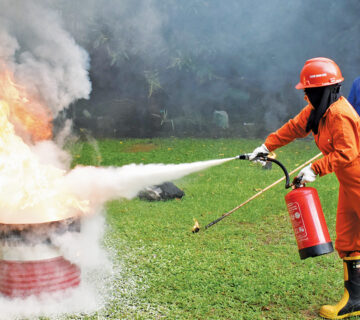Imagine being on a ship and having a fire break out. It may be extremely hazardous. But don’t panic; these specialized courses are there to help. On ships, people are instructed on how to prevent fires and put them out if they occur. We’ll examine these fire fighting courses in detail in this blog and examine their significance. Flames on ships can be particularly challenging since they differ from building flames. Because of this, those working on ships must acquire specialized knowledge to keep everyone safe.
We’ll navigate all the details, from comprehending the various threats that ships face to knowing how to employ the instruments and techniques that put out fires.
Importance of Fire Protection And fire fighting Onboard Ships Courses
Safe Ship Sailing: Ships can catch fire, just like at home. These firefighting courses teach sailors how to prevent fires and what to do if they happen.
Special Sea Dangers: Ships’ fires are trickier because they’re in the middle of the water. These courses help sailors understand the extra challenges of fighting fires at sea.
Knowing the Signs: Sailors learn about things that can start fires, like broken wires or machines that aren’t working right. This helps them spot problems before they turn into big fires.
Firefighting Skills: These courses teach sailors how to use tools like fire extinguishers to stop fires. It’s like giving them superpowers to keep everyone safe.
Teamwork is Important: When a fire starts, everyone must cooperate. These seminars show sailors how to collaborate and adhere to directions to extinguish the fire swiftly.
Lives and ship safety: Controlling fires protects passengers and safeguards the ship. The ship can continue to sail smoothly as everyone returns to their homes and families.
Rules and regulations: For everyone’s safety, all ships must abide by certain guidelines. These seminars ensure that sailors are aware of these guidelines to remain prepared.
Confidence Booster: Sailors feel confident and ready when they have this knowledge. It’sIt’s like having a safety plan so they’re not scared if a fire happens.
Always Learning: There’s always something new, even if you know a lot. These safety training programs help sailors stay updated with the latest fire safety techniques.
In India, maritime safety and training follow international standards set by the International Maritime Organization (IMO) and the Standards of Training, Certification, and Watchkeeping (STCW) Code. The Directorate General of Shipping (DGS) in India oversees maritime training and certification to ensure the safety and competence of seafarers.
Fire Protection and Firefighting Courses
STCW Fire Prevention and Fire Fighting (FPFF) Course:
This course aligns with India’s maritime safety regulations and is based on the STCW 78/95 guidelines, Section A-VI/1, and the IMO Model Course 1.20. It covers fire prevention and firefighting skills required by Indian seafarers. The fire safety training ensures seafarers can respond effectively to fire emergencies on ships while meeting Indian maritime safety standards.
Ship’s SOLAS Training Manual (FFE) – Part I: Theory of Fire & Fire Extinguishment (Management) Course:
This course provides Indian seafarers with insights into firefighting techniques and SOLAS requirements. It covers using fire extinguishers, firefighting with hoses and fixed installations, and knowledge necessary for SOLAS compliance in India.
Ship’s SOLAS Training Manual (FFE) – Part I: Theory of Fire & Fire Extinguishment (Operational) Course:
Similar to the previous course, this training covers firefighting techniques with fire extinguishers, hoses, and fixed installations. It’s designed to align with India’s SOLAS Training Manual requirements.
Ship’s SOLAS Training Manual (FFE) – Part III: Fire Fighting Equipment Course:
Aligned with India’s maritime regulations, this course provides Indian seafarers with firefighting techniques using fire extinguishers, hoses, and fixed installations. It also includes information about drills, training, and maintenance procedures specific to India.
Ship’s SOLAS Training Manual (FFE) – Part II: Structural Fire Protection Course:
This course is tailored to India’s maritime safety standards. It focuses on ensuring the structural fire protection of Indian vessels, covering class divisions, emergency power supply systems, and crucial fire precautions for important ship areas.
Practical Training of Fire Prevention and Fire Fighting Course:
Designed to meet India’s maritime safety needs, this course provides practical fire prevention and firefighting training. Based on STCW 78/95 guidelines and the IMO Model Course 1.20, it equips Indian seafarers with hands-on skills to handle fire emergencies effectively.
Wrapping Up
So this blog was all about fire fighting courses and fire safety training to address a variety of fire-related circumstances. The Basic Firefighting Course imparts basic knowledge while the STCW Fire Prevention and Fire Fighting (FPFF) Course covers advanced techniques. These courses can help maritime employees become better at managing hazards, preventing fires, and ensuring everyone onboard is safe. Prioritizing maritime safety is still essential, and for safer journeys and effective marine operations, committed learning and adherence to set training requirements are essential.
The courses from Training Ship Varren have been approved by the Directorate General of Shipping (DGS).This guarantees that your education complies with legal criteria and equips you with the skills necessary to succeed in your marine career while upholding the highest standards of safety. For any additional information, please contact us at any time. You can contact us anytime for any further detail.




